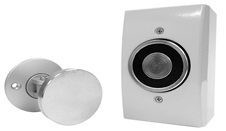
At every step of a building design or specification process, stakeholders have a choice. Decisions made at this stage materially impact the building experience far in the future. For this reason, many regulations aim to protect the accessibility rights of all kinds of users, young and old, ambulant or wheelchair-using.
One key European guidance document which promotes accessibility for all is CEN/TR 158941. To meet the recommendations of this technical report, door closers must offer a rapidly decreasing opening force. The force a user must apply should reduce by 40% when an opening angle of 60° is reached.
Compliance with CEN/TR 15894 gives architects, building managers and users confidence that a building design makes occupants safer; and that the interior is reliable and user-friendly, with special attention paid to children, the elderly and the disabled.
When every important door opens comfortably, building owners offer a more equal experience and encourage participation. Fitting the right door closer at an entrance or interior door can make the difference between a truly accessible building and one which simply swaps one barrier for another. However, according to Assa Abloy, not every door closer can do the job which building designers and retrofitters require.
Rack and pinion door closers with guide rail may be hard for less-able building users to open. Many won’t have the strength to exert the necessary opening force in comfort. Cam-Motion can help solve these issues. Door closers equipped with Assa Abloy’s Cam-Motion technology offer ergonomic and convenient opening for everyone. Unlike traditional rack and pinion guide rail systems, Cam-Motion guide rail door closers need a push-force that falls rapidly.
According to the company, they exceed the recommendations of CEN/TR 15894 by mirroring the power of the human elbow, where torque also reduces sharply as the arm extends. This creates a much more comfortable opening experience without sacrificing the force required to close properly to meet other safety standards.
“Typical symmetric and asymmetric rack and pinion door closers with guide rail are not able to match this performance,” explains Andreas Gmelin, Product Management and Business Development Director Door Closers at Assa Abloy Opening Solutions EMEIA. “Critically, the door also closes fully and automatically, for user convenience, energy efficiency, building security and to comply with fire protection rules. No one should have to pull hard to shut and maintain a building’s fire protection.”
Assa Abloy Cam-Motion door closers also offer optional closing delay, giving users extra time to pass through. To protect the frame and prevent banging into walls, backcheck function as standard across the range slows the door’s final opening section.
Cam-Motion door closers are also designed to maximise specification and installation flexibility. Their symmetric cam design allows fitting to either frame or door, and on hinge or non-hinge side; no compromises or installer workarounds are needed. A range of models can equip single- and double-leaf doors.
In meeting these important accessibility criteria, they do not sacrifice durability or fire resistance. All Assa Abloy Cam-Motion devices are tested to EN 1154 standard for fire and smoke protection. Optional built-in smoke detectors and electromechanical closing offer enhanced protection.











